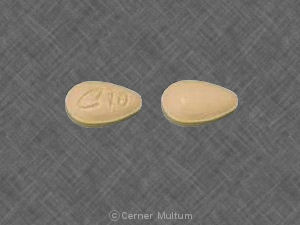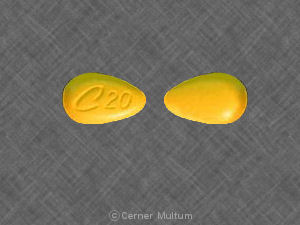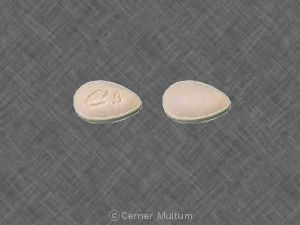What is the most important information I should know about tadalafil?
Taking tadalafil with certain other medicines can cause a sudden and serious decrease in blood pressure.
Do not take tadalafil if you also use riociguat, or a nitrate drug such as nitroglycerin, isosorbide dinitrate, isosorbide mononitrate, or recreational drugs such as "poppers."
Get medical help at once if you have nausea, chest pain, or dizziness during sex.
What is tadalafil?
Tadalafil relaxes muscles of the blood vessels and increases blood flow to particular areas of the body.
Tadalafil under the name of Cialis is used to treat erectile dysfunction (impotence) and symptoms of benign prostatic hypertrophy (enlarged prostate). Another brand of tadalafil is Adcirca, which is used to treat pulmonary arterial hypertension and improve exercise capacity in men and women.
Do not take Cialis while also taking Adcirca.
Tadalafil may also be used for purposes not listed in this medication guide.
What should I discuss with my healthcare provider before taking tadalafil?
You should not take tadalafil if you are allergic to it.
Taking tadalafil with certain other medicines can cause a sudden and serious decrease in blood pressure. Do not take tadalafil if you also use:
- riociguat (to treat pulmonary arterial hypertension); or
- a nitrate drug (for chest pain or heart problems) such as nitroglycerin, isosorbide dinitrate, isosorbide mononitrate, or recreational drugs such as amyl nitrate or nitrite "poppers".
Some tadalafil can remain in your bloodstream for 2 or more days after each dose you take (longer if you have liver or kidney disease). Avoid nitrate use during this time.
To make sure tadalafil is safe for you, tell your doctor if you have ever had:
- heart disease or heart rhythm problems;
- a heart attack or stroke;
- angina (chest pain), high or low blood pressure;
- pulmonary hypertension (unless you are taking tadalafil for this);
- a condition called pulmonary veno-occlusive disease (narrowing of the veins that carry blood from the lungs to the heart);
- liver or kidney disease (or if you are on dialysis);
- vision loss, or retinitis pigmentosa (an inherited condition of the eye);
- a bleeding disorder;
- a blood cell disorder such as sickle cell anemia, multiple myeloma, or leukemia;
- a physical deformity of the penis (such as Peyronie's disease), or an erection lasting longer than 4 hours;
- a stomach ulcer; or
- health problems that make sexual activity unsafe.
Sudden vision loss has occurred in a small number of people taking medicines like tadalafil (Viagra or others). Most of these people already had certain eye problems or risk factors for blood vessel disorders (heart disease, diabetes, high blood pressure, high cholesterol, coronary artery disease, smoking, or being over 50 years old). It is not clear whether the medicine was the actual cause of vision loss.
Tadalafil is not expected to harm an unborn baby. Tell your doctor if you are pregnant or plan to become pregnant.
It is not known whether tadalafil passes into breast milk or if it could affect the nursing baby. Tell your doctor if you are breast-feeding.
Tadalafil is not approved for use by anyone younger than 18 years old.
How should I take tadalafil?
Tadalafil is usually taken only once per day. Follow all directions on your prescription label. Do not take this medicine in larger or smaller amounts or for longer than recommended.
Tadalafil can be taken with or without food.
Do not break or split a Cialis tablet. Swallow it whole.
For erectile dysfunction, take Cialis just before sexual activity but not more than once per day.
Cialis can help achieve an erection when sexual stimulation occurs. An erection will not occur just by taking a pill. Follow your doctor's instructions.
Do not take Cialis for erectile dysfunction if you are taking Adcirca for pulmonary arterial hypertension.
Store at room temperature away from moisture and heat.
What happens if I miss a dose?
If tadalafil is used as needed, you are not likely to be on a dosing schedule.
If you take tadalafil every day and you miss a dose, take the missed dose as soon as you remember. Skip the missed dose if it is almost time for your next scheduled dose. Do not take extra medicine to make up the missed dose.
What happens if I overdose?
Seek emergency medical attention or call the Poison Help line at 1-800-222-1222.
What should I avoid while taking tadalafil?
Drinking alcohol with this medicine can cause side effects.
Grapefruit and grapefruit juice may interact with tadalafil and lead to unwanted side effects. Avoid the use of grapefruit products while taking this medicine.
What are the possible side effects of tadalafil?
Get emergency medical help if you have signs of an allergic reaction: hives; difficulty breathing; swelling of your face, lips, tongue, or throat.
Stop and get medical help at once if you have nausea, chest pain, or dizziness during sex. You could be having a life-threatening side effect.
Stop using tadalafil and call your doctor at once if you have:
- a light-headed feeling, like you might pass out;
- an erection is painful or lasts longer than 4 hours (prolonged erection can damage the penis);
- vision changes or sudden vision loss;
- ringing in your ears or sudden hearing loss; or
-
heart attack symptoms --chest pain or pressure, pain spreading to your jaw or shoulder, nausea, sweating.
Common side effects may include:
- headache;
- flushing (warmth, redness, or tingly feeling);
- nausea, upset stomach;
- stuffy nose; or
- muscle pain, back pain, pain in your arms or legs.
This is not a complete list of side effects and others may occur. Call your doctor for medical advice about side effects. You may report side effects to FDA at 1-800-FDA-1088.
What other drugs will affect tadalafil?
Tell your doctor about all your current medicines and any you start or stop using, especially:
- medicines to treat erectile dysfunction or pulmonary arterial hypertension;
- an antibiotic or antifungal medicine;
- antiviral medicine to treat hepatitis C or HIV/AIDS;
- drugs to treat high blood pressure or a prostate disorder; or
- seizure medicine.
This list is not complete. Other drugs may interact with tadalafil, including prescription and over-the-counter medicines, vitamins, and herbal products. Not all possible interactions are listed in this medication guide.
Where can I get more information?
Your pharmacist can provide more information about tadalafil.
Remember, keep this and all other medicines out of the reach of children, never share your medicines with others, and use this medication only for the indication prescribed.
Every effort has been made to ensure that the information provided by Cerner Multum, Inc. ('Multum') is accurate, up-to-date, and complete, but no guarantee is made to that effect. Drug information contained herein may be time sensitive. Multum information has been compiled for use by healthcare practitioners and consumers in the United States and therefore Multum does not warrant that uses outside of the United States are appropriate, unless specifically indicated otherwise. Multum's drug information does not endorse drugs, diagnose patients or recommend therapy. Multum's drug information is an informational resource designed to assist licensed healthcare practitioners in caring for their patients and/or to serve consumers viewing this service as a supplement to, and not a substitute for, the expertise, skill, knowledge and judgment of healthcare practitioners. The absence of a warning for a given drug or drug combination in no way should be construed to indicate that the drug or drug combination is safe, effective or appropriate for any given patient. Multum does not assume any responsibility for any aspect of healthcare administered with the aid of information Multum provides. The information contained herein is not intended to cover all possible uses, directions, precautions, warnings, drug interactions, allergic reactions, or adverse effects. If you have questions about the drugs you are taking, check with your doctor, nurse or pharmacist.
Copyright 1996-2018 Cerner Multum, Inc. Version: 11.01. Revision date: 5/18/2017.


